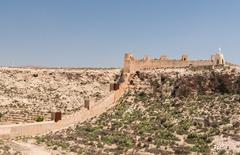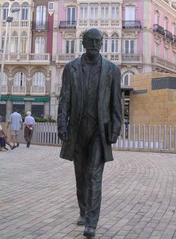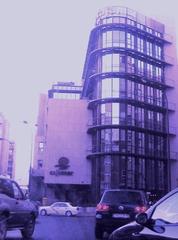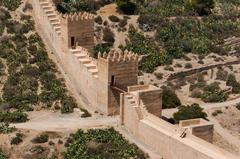Cortijo Nuevo Almería, Spain: Visiting Hours, Tickets, and Travel Guide
Date: 14/06/2025
Introduction
Cortijo Nuevo, located in the province of Almería in southeastern Spain, is an archaeological and cultural gem that captures the essence of Andalusian rural life and prehistory. Renowned for its distinctive Bronze Age tumuli, stone-built remains, and the traditional cortijo farmhouse estate, the site offers a unique window into the region’s multi-layered history. This comprehensive guide provides everything you need for a meaningful visit, including access information, ticketing, travel tips, nearby attractions, and cultural insights.
While Cortijo Nuevo is not a formal museum and lacks official guided tours, it remains a significant part of Almería’s heritage. The estate’s archaeological relevance is complemented by its integration into the expanding urban fabric of Almería, bridging ancient traditions and modern life. Surrounding museums and heritage sites, such as the Alcazaba of Almería and the Museum of Almería, further enrich the visitor experience, offering extensive historical context and artifacts from the region.
For those seeking a deeper understanding, this guide highlights how to reach the site, the best times to visit, accessibility details, and recommendations for exploring related attractions. It also delves into local customs, festivals, and gastronomy, encouraging visitors to engage responsibly with the vibrant community and living traditions of Andalusia. For interactive exploration, digital resources and the Audiala app provide immersive ways to discover Cortijo Nuevo’s past and present.
For further research, consult official resources and trusted heritage portals linked at the end of this article. (Weekendr, Experience Acciona, Junta de Andalucía, Urbipedia)
Table of Contents
- Overview: What is Cortijo Nuevo?
- Visiting Hours and Ticket Policy
- How to Get There
- Historical and Archaeological Background
- Architectural Features
- Nearby Attractions
- Accessibility and Practical Tips
- Local Culture, Gastronomy, and Events
- Frequently Asked Questions
- Plan Your Visit and Additional Resources
- References
Overview: What is Cortijo Nuevo?
Cortijo Nuevo is a traditional Andalusian cortijo estate, notable for its archaeological remains that indicate occupation from the Chalcolithic period (Copper Age) through Late Antiquity. Located near the Andarax River plains within the city limits of Almería, the site features tumuli, stone walls, and unique architectural elements, reflecting prehistoric settlements and the evolution of Andalusian rural architecture. The estate’s history is enriched by layers of Moorish, Christian, and modern influences, each leaving a distinct mark on its development and function.
Visiting Hours and Ticket Policy
Current Access Policy
- Visiting Hours: Cortijo Nuevo does not operate as a formal tourist attraction with controlled hours. The site is publicly visible from surrounding areas at any time, but direct unsupervised access is generally restricted to protect its integrity.
- Tickets: No entrance fee or ticketing system is in place due to its status as an archaeological zone rather than a managed museum.
- Guided Tours: There are no regular guided tours. Special access or guided visits may be arranged during local heritage events or archaeological campaigns — consult the Junta de Andalucía for up-to-date opportunities.
How to Get There
- By Car: The most convenient way to reach Cortijo Nuevo is by driving from Almería city center. Take the AL-12 or N-344 toward the airport, then follow the signs toward Rambla Morales and the Buenavista/Mazaroque road.
- Public Transport: There is no direct public transportation to the site. Taxis or car rentals are recommended.
- Parking: No official parking is available; visitors may park along the roadside, being mindful not to obstruct local agricultural operations (Junta de Andalucía PDF).
- Accessibility: The surrounding neighborhood is accessible by paved roads, but expect to walk on uneven ground near the site.
Historical and Archaeological Background
Origins and Development
Cortijo Nuevo’s roots extend to the Bronze Age, evidenced by tumuli and prehistoric structures. The term “cortijo” denotes a rural estate typical of Andalusia, combining living quarters, farm buildings, and adjacent land. Over centuries, the estate witnessed innovations in irrigation, agricultural expansion under Moorish rule, and the rise of self-sufficient rural communities in the 19th and early 20th centuries.
Archaeological Significance
- Tumuli and Wall Remains: The site is characterized by tumular mounds and exposed stone walls, some with clay-bonded compartments and stone conduits (Urbipedia, Wikipedia).
- Artifacts: Surface finds include Bronze Age ceramics, hand mills, and lithic implements. Many artifacts are housed at the Museum of Almería.
- Protection: Cortijo Nuevo is a designated Bien de Interés Cultural (BIC), ensuring strict legal protection (BOJA 146, 16/12/1999).
Architectural Features
Cortijo Nuevo’s architecture showcases thick whitewashed walls, flat roofs, and a central courtyard—classic elements of Andalusian rural design, optimized for climate and agricultural life. The estate’s layout reflects the evolution from single-family farmsteads to larger, community-oriented holdings with chapels, stables, and storage buildings.
Nearby Attractions
- Alcazaba of Almería: A monumental Moorish fortress with panoramic views.
- Museum of Almería: Home to regional archaeological treasures, including finds from Cortijo Nuevo.
- Almería Cathedral: An architectural blend of Gothic and Renaissance styles.
- Other Sites: Nearby Bronze Age and Roman sites, such as Los Millares and Barranquete.
Accessibility and Practical Tips
- Terrain: Expect uneven ground; sturdy footwear is recommended.
- Facilities: No on-site toilets, refreshments, or visitor center.
- Best Time to Visit: Spring and autumn for milder weather.
- Safety: Follow all posted regulations and avoid disturbing the site or adjacent farmland.
- Accessible Tourism: The site is not adapted for wheelchairs or those with mobility impairments.
Local Culture, Gastronomy, and Events
Rural Traditions and Hospitality
Cortijo Nuevo is a symbol of Andalusia’s communal rural life—where hospitality, shared meals, and traditional music remain central to the local way of living. Guests are welcomed warmly and often invited to participate in local customs. (Studying in Spain)
Gastronomy
Enjoy Almería’s cuisine: fresh vegetables, legumes, local meats, and tapas. The region’s food culture places emphasis on communal dining and seasonal, home-cooked dishes. (My Little World of Travelling)
Festivals
Major events include Semana Santa (Holy Week) and harvest festivals, featuring processions, music, and traditional fare. Participation is encouraged; respectful engagement is valued. (Sensational Spain)
Frequently Asked Questions
Q: What are the visiting hours?
A: The site is publicly visible at any time, but direct access is limited. Confirm conditions with local authorities before your visit.
Q: Is there an entrance fee?
A: No, as it is not a ticketed attraction.
Q: Are guided tours available?
A: Not regularly; special visits may occur during archaeological events.
Q: Is the site accessible for people with disabilities?
A: No, due to uneven terrain and lack of facilities.
Q: How do I reach Cortijo Nuevo?
A: By car from Almería city. No direct public transport is available.
Plan Your Visit and Additional Resources
- Museum of Almería: See artifacts from Cortijo Nuevo and regional displays.
- Junta de Andalucía: Check for the latest heritage updates and special events.
- Audiala App: Download for interactive maps and audio guides.
For detailed archaeological documentation, see the Junta de Andalucía resource.
References
- Weekendr – Staying in a Cortijo in Almería
- Experience Acciona – Archaeological Finds
- Junta de Andalucía – Department of Culture
- Urbipedia – Cortijo Nuevo (Almería)
- Museum of Almería
- ISPRS Archives – Vernacular Architecture in Almería
- Studying in Spain – Culture and Customs
- My Little World of Travelling – Things to Do in Almería
- Sensational Spain – Almería
- Wikipedia – Cortijo Nuevo
For the latest updates, download the Audiala app and follow official channels for real-time information and exclusive content. Plan your visit today to discover one of Andalusia’s most intriguing historical sites.



